
When was the last time you visited Amazon? Did you notice features like "Based on items you have viewed recently" or "Inspired by your shopping trends." staring at you in the face? Usually, these sections are followed by carousels of more products to explore and purchase, and they are not randomly picked. Let's just say it demonstrates a powerful tool that eCommerce marketers can use to increase sales called AI product recommendations. They provide highly personalized suggestions, which can lead to more conversions and sales. According to research, product recommendations make up 35% of Amazon's sales. Apart from that, they also enhance customer satisfaction, giving you an advantage over competitors. Let's explore the top 6 AI product recommendation tools that can take your e-commerce business to new heights without wasting any more time.
Understanding AI Product Recommendations

AI product recommendations are created using algorithms that study customer data to predict which products they'll enjoy. This personalized approach enhances the shopping experience, boosting engagement and sales while giving you an edge over competitors. How does it work? AI algorithms analyze data from different sources like browsing history, purchase records, search queries, and reviews. They spot patterns and preferences to make accurate recommendations. It's similar to providing each customer with a shopping assistant.
Types of AI Recommendation Systems
There are different types of AI recommendation systems which include:
- Collaborative Filtering
This method recommends what other customers with similar interests have bought or liked. If two customers have similar tastes, one customer's preferences can help suggest products to the other.

- Content-Based Filtering
Here, product recommendation is based on their attributes and features. For example, if a customer has purchased products with a specific brand or category, the algorithm will suggest other products with similar attributes.

- Hybrid Systems
This is a combination of collaborative filtering and content-based filtering to provide even more accurate and personalized recommendations. By using both methods, these systems can understand and predict customer preferences.
Benefits of AI Product Recommendations for E-commerce
AI product recommendation has a lot of benefits for people who own online stores. Some of them are:
- Increased Sales
Selling more products is a top priority for any e-commerce business. With AI product recommendations you can boost your sales by suggesting personalized products that customers want. These suggestions are based on the customer's past behavior and preferences. When shoppers see products that match their tastes, they will definitely make a purchase. For instance, if someone buys a camera, it can recommend accessories like a flash.

- Enhanced Customer Experience
AI product recommendations improve the shopping experience and increase conversion rates and average order value by suggesting products that match each customer's preferences. Shoppers now expect personalized online experiences, and 76% feel frustrated when they don't get them. When you suggest products that align with their interests and preferences, you show customers that you care about their needs. This leads to increased customer satisfaction, loyalty, and retention. - Better Inventory Management
Managing inventory can be challenging, but AI product recommendations make it easier. By studying customer data and buying habits, it can predict which products will be in high demand. This helps you stock popular items and avoid having too many items that don't sell as well.
How AI Product Recommendations Work
- Data Collection and Analysis
AI product recommendations start with data collection and lots of it. We're talking about customer browsing history, purchase behavior, search queries, ratings, and reviews. All this data is collected and analyzed to identify patterns and preferences that are not obvious to humans. Let's just say it's a super-powerful detective, sifting through clues to uncover what customers want. - Machine Learning Models
Once the data is collected, machine learning models come into play. These models are algorithms that learn from the data to make predictions. They analyze customer behavior and preferences to figure out what products a customer might be interested in. The more data they process, the better they get at making recommendations. For example, if a customer frequently buys sports gear, the machine learning model will learn to suggest new sports products to them.

- Real-Time Personalization
One of the features of AI product recommendations is real-time personalization. It delivers recommendations instantly, based on the customer's current activity on the website. If a customer is browsing a particular category or looking at specific products, they can immediately suggest similar or complementary items.
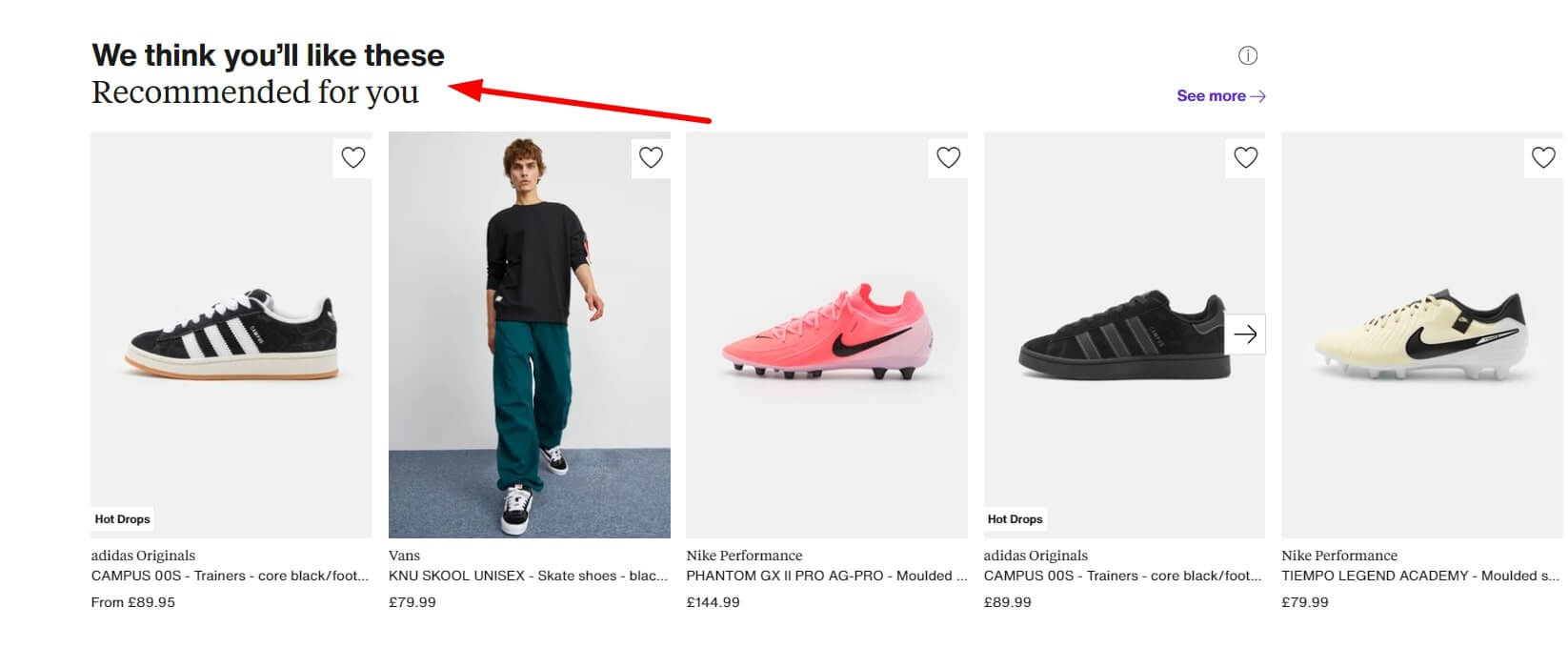
Top AI Product Recommendation Tools
Since the inception of AI recommendation tools, there's been a lot of them. But, we're just going to take a look at the top six tools. They are:
1. Dynamic Yield
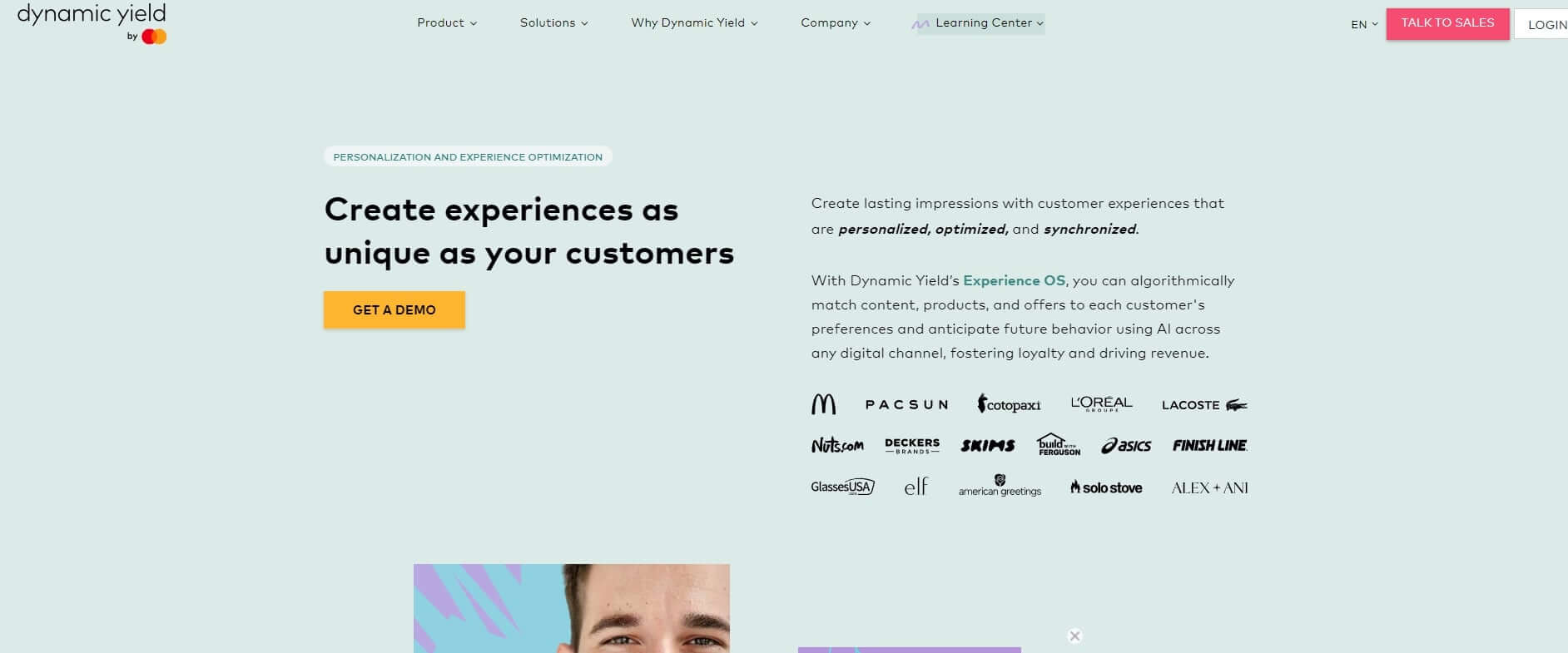
Dynamic Yield is a powerful AI-driven personalization platform designed to improve user experiences. It offers advanced recommendation algorithms that customize product suggestions based on customer behavior, preferences, and past interactions. Some of its features are A/B testing, real-time targeting, and personalized content recommendations.
- Benefits and use case
It's no surprise that Dynamic Yield helps businesses boost conversion rates and customer engagement by providing highly relevant product recommendations. For example, an online retailer who uses this tool can increase sales by showing personalized product suggestions to each visitor based on their browsing history and buying habits
2. Bodt.io
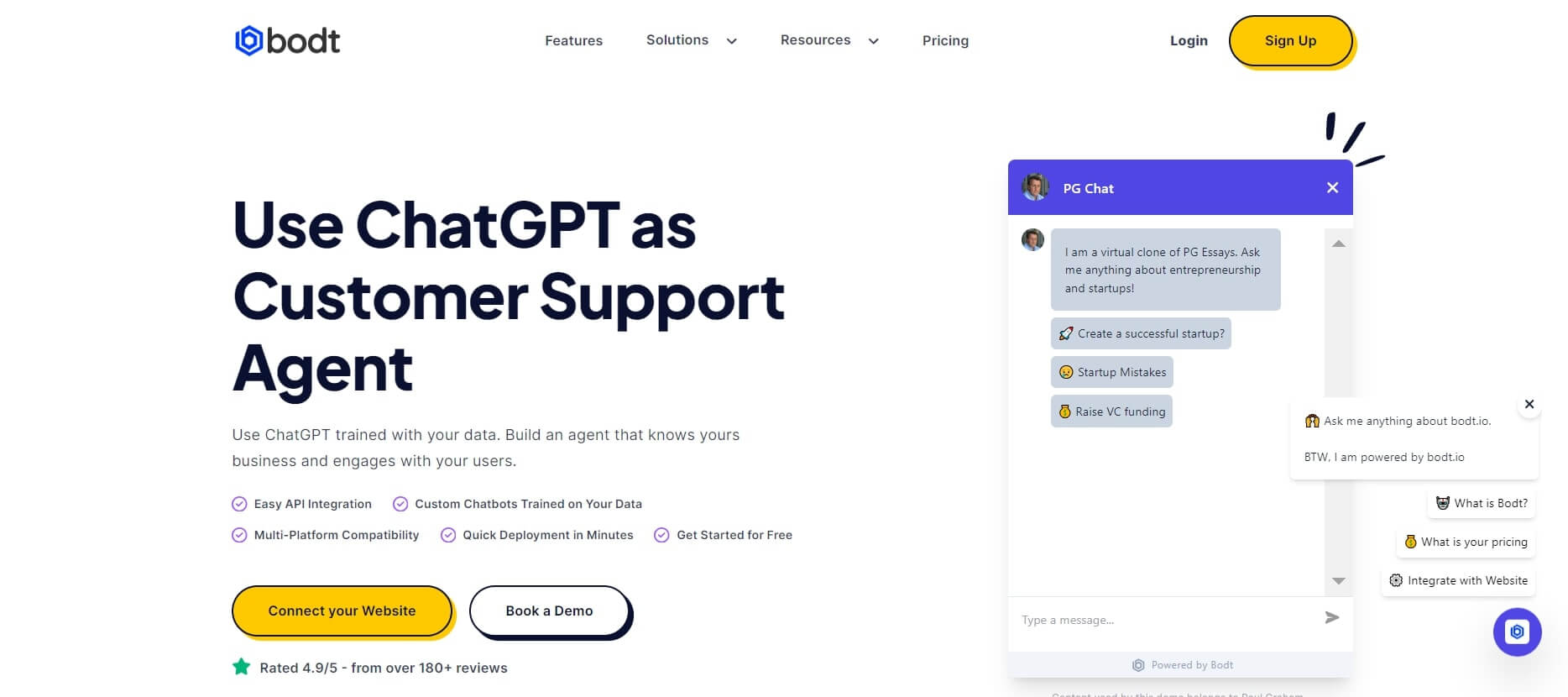
Bodt.io is a no-code AI chatbot platform designed to enhance customer service, lead generation, and sales for businesses. It allows the creation and deployment of custom chatbots without programming skills. These chatbots are trained on the business’s data, ensuring personalized and accurate responses. It has features like 24/7 customer support, multilingual capabilities, proactive engagement, and integration with Shopify and WordPress.
- Benefits and use cases
Bodt.io benefits businesses by improving customer satisfaction and loyalty through personalized shopping experiences. The platform engages potential customers by collecting information and nurturing leads through automated interactions. An example is an online fashion store, Fabiani Gioiellerie, who use its AI-powered chatbot to provide customer support, manage order tracking, and offer personalized outfit suggestions based on individual customer preferences.


3. Algolia Recommend
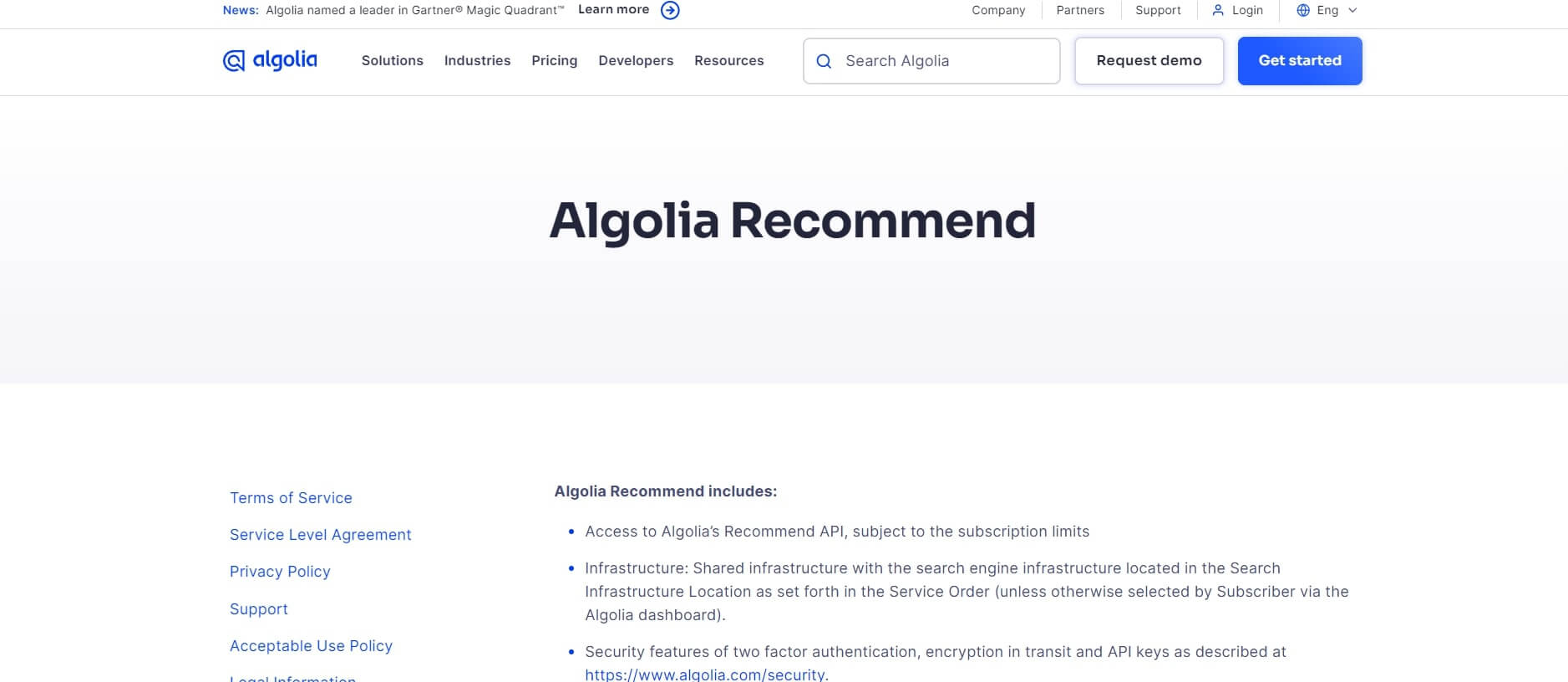
Looking for a recommendation engine that can transform your search and recommendations? Algolia Recommend is the way to go. It is an AI-powered recommendation tool that leverages Algolia’s powerful search technology to deliver personalized product suggestions. Its key features include advanced filtering options, real-time indexing, and easy integration with existing e-commerce systems.
- Benefits and use case
Algolia Recommend helps businesses enhance the user experience by providing relevant product suggestions, leading to increased sales and customer retention. A common use case is an e-commerce site using Algolia Recommend to offer personalized product suggestions as customers type in the search bar, making it easier for them to find what they need.
4. Nosto
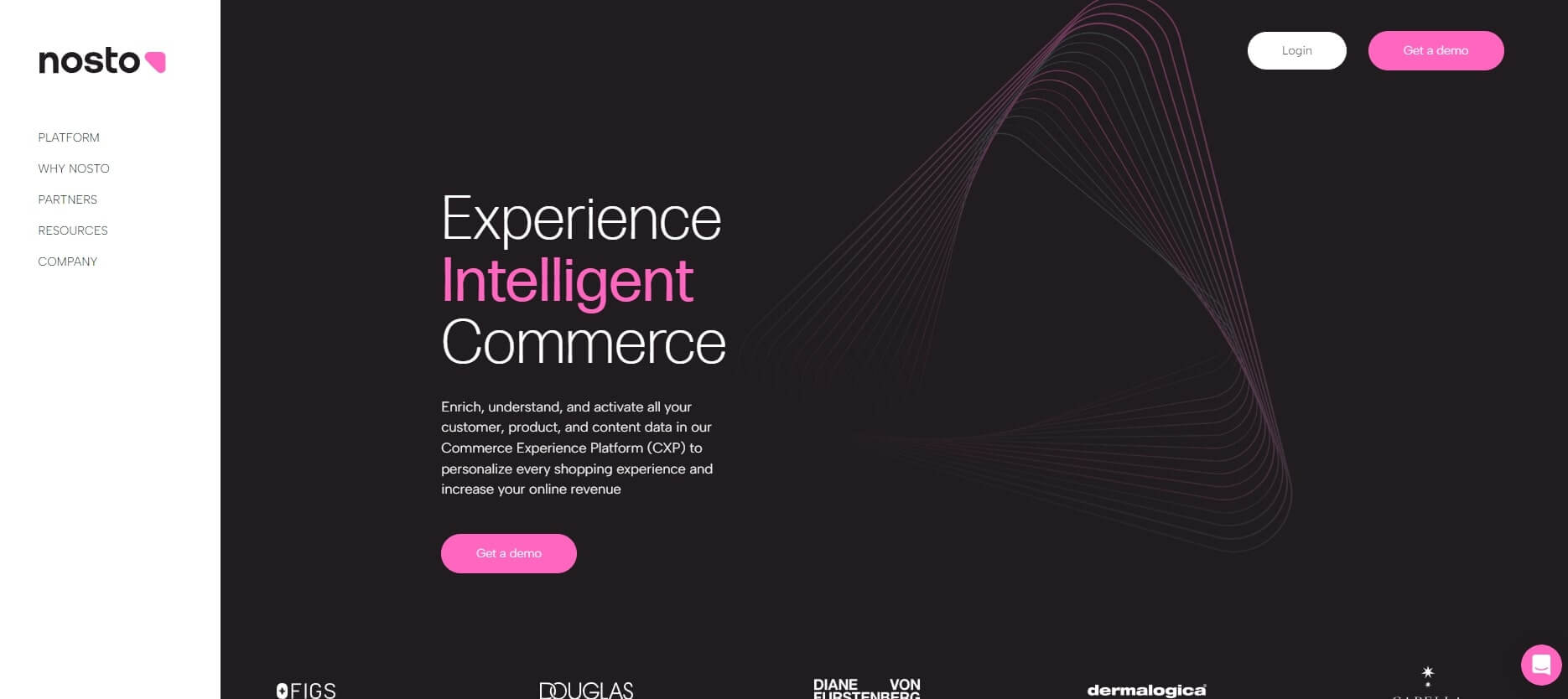
Nosto is another great option for e-commerce businesses looking for a user-friendly personalization solution. With personalized recommendations, customer segmentation, and real-time analytics, you'll be able to increase conversions, enhance customer experience, and boost revenue. Nosto also supports multiple languages and currencies, making it ideal for global businesses.
- Benefits and use case
Nosto helps online retailers raise average order value and build customer loyalty by offering personalized shopping experiences. For example, a global e-commerce site can use Nosto to give customers in different regions specific product recommendations and dynamic content.
5. Salesforce Einstein
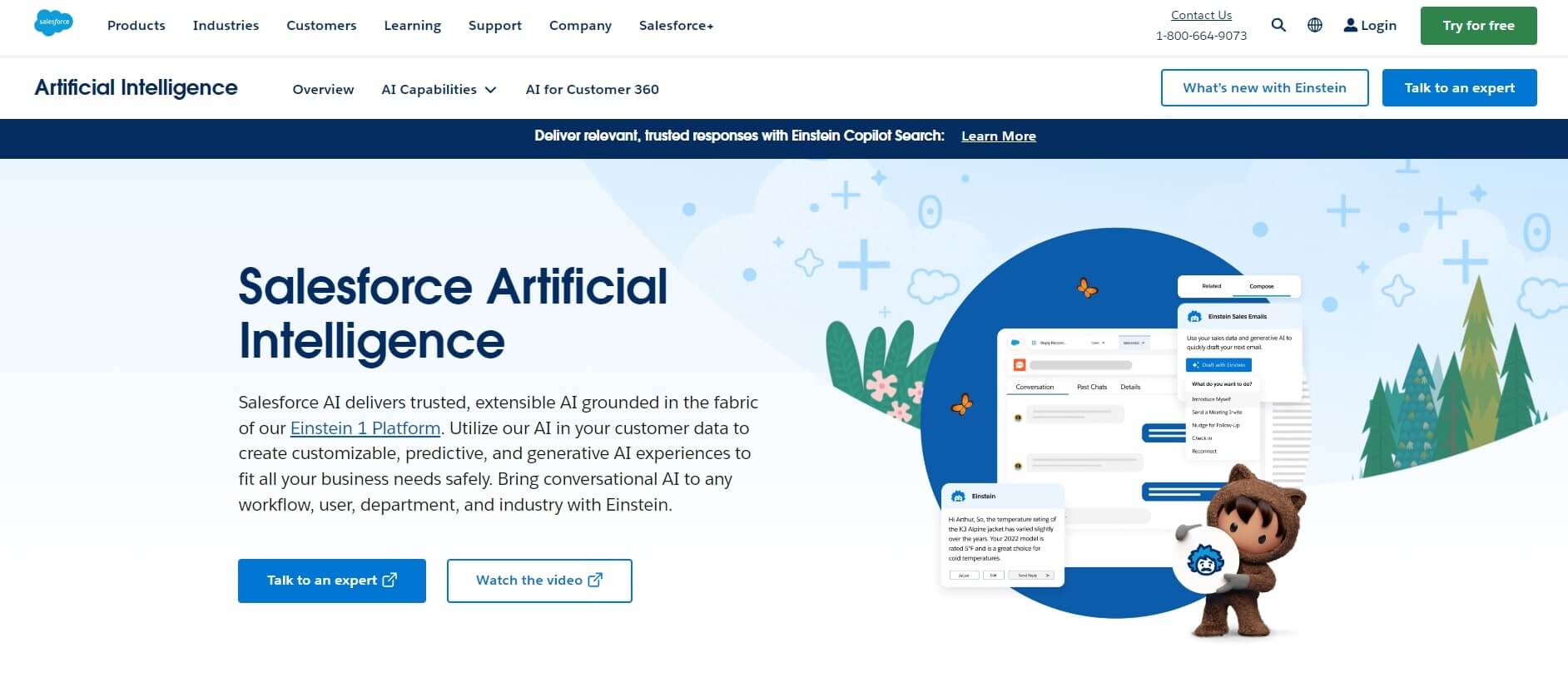
If you're already using Salesforce, you'll want to check out Salesforce Einstein. It is an AI tool built into the Salesforce platform to provide predictive analytics, personalized product recommendations, and automated marketing campaigns. When you use customer data from Salesforce Einstein, it provides accurate and timely suggestions about customer's preferences.
- Benefits and use case
Salesforce Einstein benefits businesses by boosting sales and improving customer relationships through personalized recommendations and insights. A company can use Salesforce Einstein to recommend products to customers based on their past purchases and interactions with the brand, leading to higher conversion rates and customer satisfaction.
6. Recombee
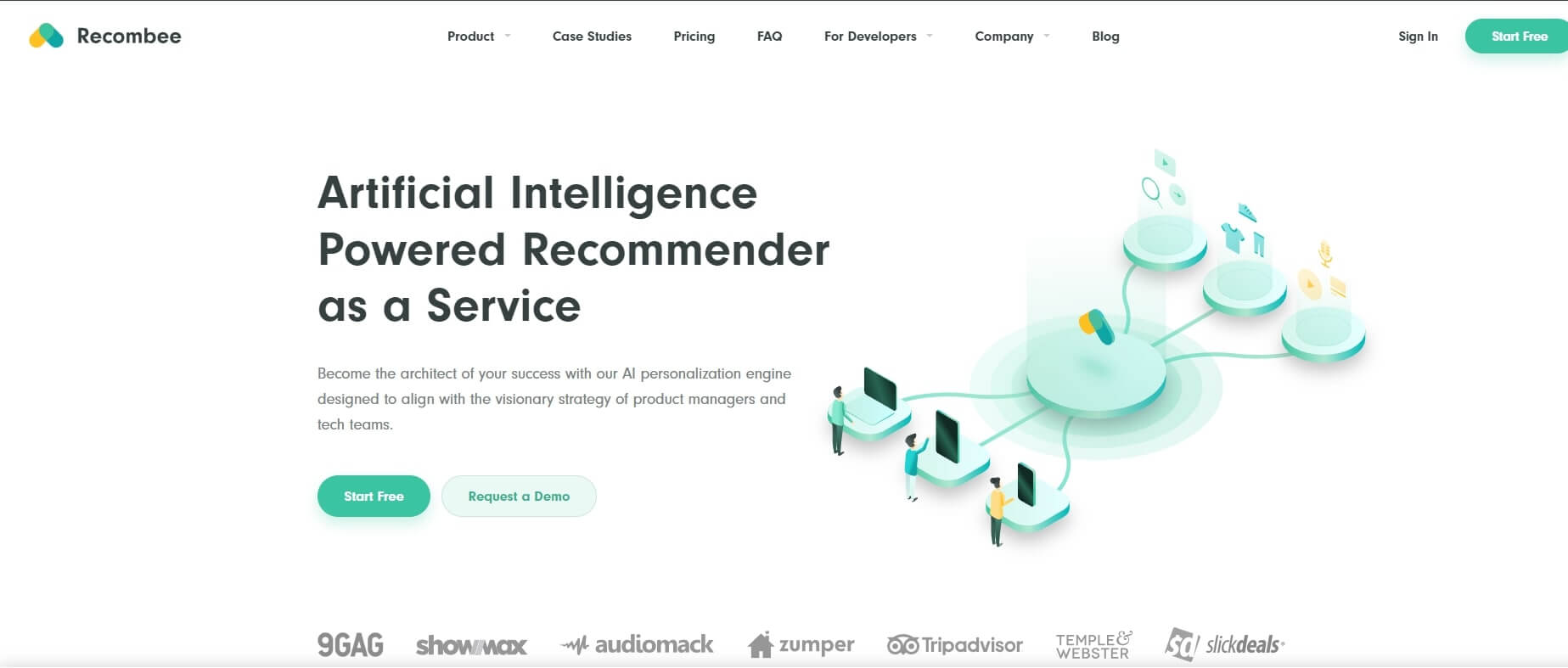
Recombee is a flexible AI tool that personalizes product suggestions by looking at user behavior and preferences. It uses techniques like collaborative filtering, content-based filtering, and a mix of both. Recombee is also easy to integrate with different e-commerce platforms, making it a great choice for online stores.
- Benefits and use case
Recombee helps businesses enhance the shopping experience and increase sales through accurate and personalized recommendations. A typical use case is an online bookstore using Recombee to recommend books to customers based on their reading history and preferences, helping them discover new titles they might enjoy.
Importance of Selecting the Best AI Product Recommendation Tool
There are many reasons you should have the best AI product recommendation tool in your online store. They include:
- Impact on E-commerce
When you shop online do you notice how the store suggests items you might like? These suggestions are product recommendations, and they play a critical role in e-commerce. They help you discover new products and make it easier to find exactly what you’re looking for. These tools also analyze the items you view, the ones you buy, and the time you spend on certain products. By doing this, they can predict what you might like and show you highly accurate and relevant recommendations.

- Enhanced Customer Experience
It's undeniable that personalization makes everyone feel special like the store was designed just for you. By showing you items that match your tastes, these tools keep you engaged and interested. When you can predict what customers may like, they feel understood and valued. This leads to increased customer satisfaction, retention, and ultimately, loyalty. - Boosting Sales and Conversion Rates
Good AI product recommendations not only help you find what you’re looking for but also suggest complementary items that you might want to add to your cart. This increases the average order value (AOV) i.e. the amount you spend in a single purchase. It also boosts conversion rates, bringing more visitors to the store, who will end up making a purchase. This will reduce the number of cart abandonments. - Staying Competitive
In an online marketplace, having the best AI product recommendation tool can set a store apart from its competitors. When a store makes it easy for you to find and buy things you like, there are high chances you're going to return. Apart from that, trends are constantly changing, and keeping up with them is very important for online stores. AI tools can quickly identify and adapt to new trends, ensuring that the store’s product recommendations are always updated. - Efficient Inventory Management
AI tools are not just about making recommendations to customers; they also help stores manage their inventory efficiently. Analyzing shopping patterns and predicting demand, can help stores keep the right amount of stock on hand. Meanwhile, we all know that having too much stock is costly while running out of popular items can lead to missed sales opportunities. You can also use these tools to balance this by predicting how much of each product is needed. This reduces overstock and prevents stockouts, ensuring that customers can always find the items they want.
How to Improve E-commerce Product Recommendations
If you're looking for ways to improve the product recommendations on your ecommerce site, you can check out some of them below:
- Leveraging Customer Data
To help you find what you want quickly, online stores collect lots of information about your shopping habits. This includes what products you look at, what you put in your cart, and what you actually buy. Once the store has collected data, it can analyze how you and other customers shop. For example, if you often look at running shoes, the store can group you with other customers who also like running shoes. This grouping is called segmentation. By understanding different shopping behaviors, the store can show you more relevant products, like running clothes or fitness trackers - Implementing Advanced Algorithms
Machine learning is like having a smart computer program that learns from your choices. For example, if you buy plates, the machine learning model will notice that and start showing you tea cups.
Also, it can give users new product recommendations instantly while they shop. Their hybrid systems combine collaborative filtering (showing you items based on what similar customers liked) and content-based filtering (showing you items similar to what you’ve bought),

- Enhancing User Experience It all starts with a good interface if you want your customers to enjoy shopping at your store. Your store must have clear categories and simple navigation so customers can easily search for products and find exactly what they want without getting confused. Aside from having a good interface, you should opt for interactive features like chatbots or even a personalized dashboard.
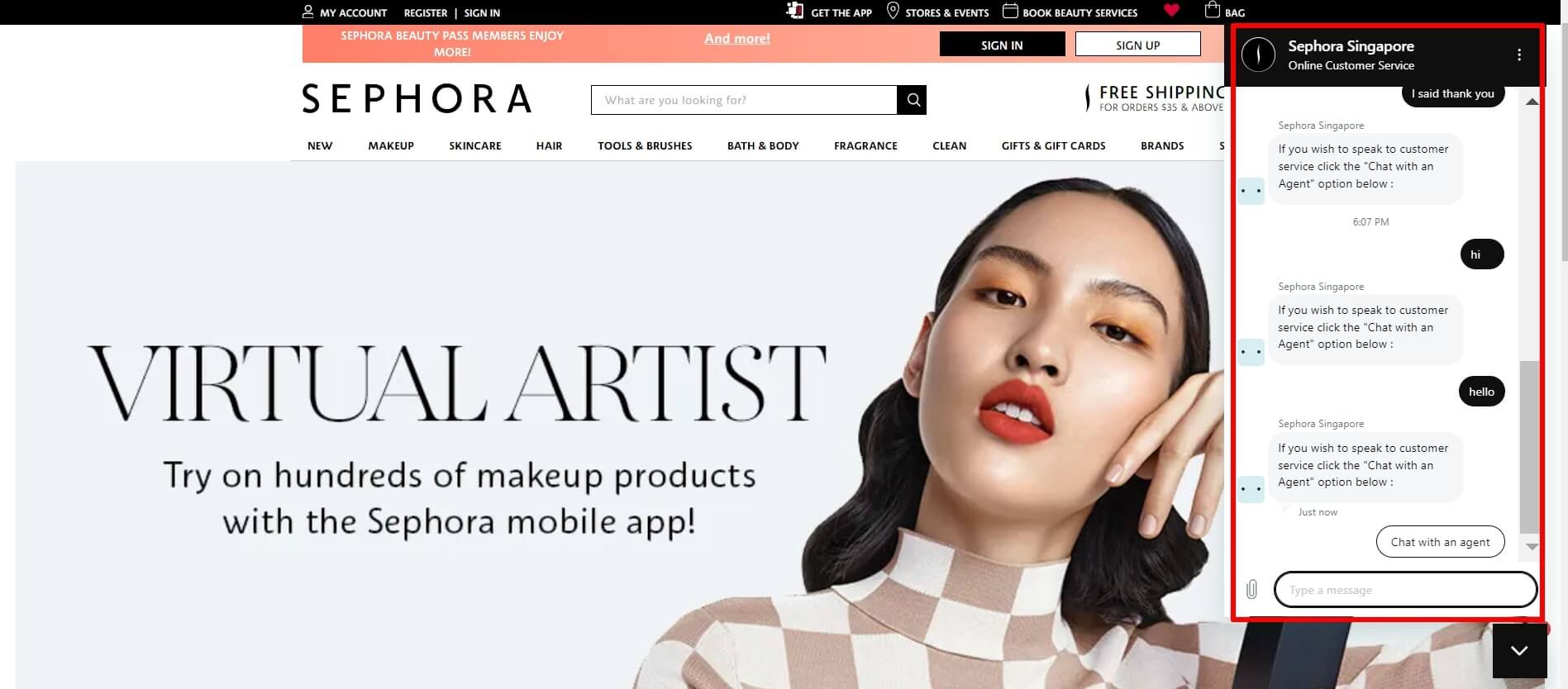
And there's another option of trying out multi-channel personalization. This means your store can reach other clients through different platforms, like your website, mobile app, and social media.
- A/B Testing and Optimization
A/B testing is like trying two different pizza toppings to see which one tastes better. Online stores can test different recommendation strategies by showing one group of customers a set of suggestions and another group a different set. By analyzing the results, you'll see which recommendations led to more purchases and then use that information to improve their system. However, the algorithms that power product recommendations need to be continuously improved, and updated to adapt to changing trends and customer preferences. - Utilizing Feedback and Reviews
Just like you tell your friends about a great book or a movie you liked, customers share their opinions about products through reviews. As an online store owner, you should pay close attention to this feedback. If many customers love a specific brand of headphones, you should prioritize recommending those headphones to new shoppers. You can also ask customers for feedback through surveys or follow-up emails. This engagement helps the store learn more about what customers want and refine its product suggestions.

- Monitoring and Analytics
Performance metrics are like report cards for an online store’s recommendation system. They show how well the store is doing in terms of showing relevant products and making sales. By monitoring these performance metrics, you gain valuable customer insights. For example, if a certain type of shoe is not selling well despite being recommended, you can analyze the data to understand why. Maybe the price is too high or the style is not appealing.
Conclusion
Are you ready to use AI product recommendation tools for your online business? As you can see, they are a great way to enhance the online customer experience and increase e-commerce sales. If you're interested, you can schedule a demo to see how the Unreality Store managed to reduce its support costs by 76% with the Bodt AI Chatbot. You'll get valuable insights into the strategies and tools that made this success possible. This session is a great opportunity for businesses looking to improve their performance. So why not schedule a call today?
FAQS
Q: What is the AI tool for product recommendations?
AI tools for product recommendations include machine learning algorithms, natural language processing, and collaborative filtering. These tools analyze customer data and behavior to suggest relevant products.
Q: What are the recommendations of AI?
AI recommendations are personalized product suggestions based on customer behavior, preferences, and demographics. These recommendations aim to enhance customer experience, drive sales, and increase loyalty.
Q: What is AI-based recommendation?
The AI-based recommendation is a system that uses artificial intelligence to suggest products to customers. This system analyzes customer data, identifies patterns, and recommends relevant products.
Q: How do you create a recommendation in AI?
To create a recommendation in AI, you need to follow a series of steps. First, collect customer data from various sources, then analyze it using machine learning algorithms to uncover valuable insights. Next, identify patterns and preferences within the data to understand customer behavior. After that, train the model to suggest relevant products based on these patterns and preferences. Finally, test and refine the recommendations to ensure they are accurate and effective, leading to personalized product suggestions that enhance customer experience and drive sales.
